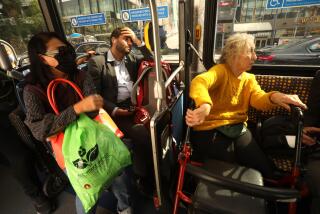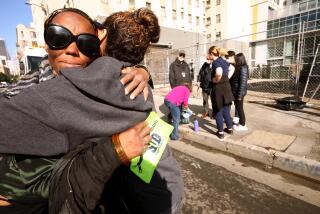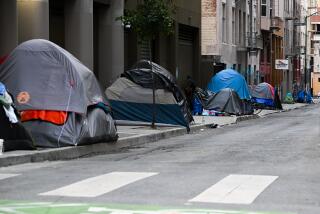Running moves Tustin woman from homelessness to hope
Melissa Marr’s alarm pierces the silence in her room at the homeless shelter. 5:40 a.m.
In the darkness, she leans over and kisses her 3-year-old daughter, rolls out of the bed and wakes her 8-year-old son, still snuggled up in the mismatched floral sheets next to his sister.
Marr slips on socks and sneakers, pulling the yellow laces tight with double knots — a must for the road.
“I love you, Mommy,” Jakob calls out as his mother opens the door to their room.
“Love you too,” she says. “Brush your teeth. I mean it.”
Then she’s out the door, down the stairs. In the half-light, she clasps the hands of the other runners from the shelter huddled on the sidewalk outside and closes her eyes to say a quick prayer. She asks for health and safety.
The runners pick up speed as they jog out of the shelter parking lot and onto Tustin’s empty suburban streets. Marr plugs her ears with earphones and presses “play” on her iPod. Christian rap blasts through the buds.
When she was living on the streets and hooked on methamphetamine, the morning light would have marked the end of another wasted night and brought the inevitable hunger for more drugs.
But on this morning, the bursts of pink and yellow in the sky seem majestic.
::
Marr remembers her first day of high school. She was wearing cut-off shorts and a white T-shirt, and she walked over to a girl she recognized from her apartment complex.
“Do you party?” the girl asked.
A rebellious teenager who had bounced between two middle schools, Marr didn’t hesitate. “Yeah,” she said, “I party.” Ten dollars later, she had two lines of crank — a low-grade methamphetamine. She’d never tried the drug.
She stepped into a handicap stall in the locker room bathroom, took out a plastic pen and snorted the thin, powdery lines.
Marr was only a freshman, but she was already known for her aggression. She fought with classmates, she argued with her parents, she sneaked out of the house to drink and smoke pot. But here in the bathroom, it all seemed to float away. “I felt like I came out of my shell,” she said.
High school was a blaze of drugs and bad relationships. She went through four schools; and by the time she graduated in 1999, she was spiraling down. She moved in with a drug dealer, worked as a stripper to make meth money and became pregnant.
She was arrested, spent some time in jail, went to rehab and tried 12-step programs. None of it worked.
One morning five years ago, she woke up in a musty motel room off Pacific Coast Highway in Ventura, edgy from an all-night binge. Her 3-year-old son, clad in Spider-Man pajamas, kept muttering the same line over and over: “Mommy, I’m hungry, I’m hungry.”
She glanced around the room with its stained furniture and maroon floral drapes. A rusty seashell decoration clung to the wall in the bathroom. There wasn’t even a water glass.
She crawled out of bed and took her son to a grocery store, where she filled a handbasket with his favorites — chocolate milk, string cheese, Lunchables and Gatorade — and walked out without paying.
“That’s when I felt completely broken,” she said.
But she hadn’t hit bottom yet. In 2008, she landed in jail for possession. This time, she faced prison time. She was 27.
Dressed in a blue jumpsuit, secured by shackles, she would wait for her mother and son to visit.
When the toddler came, she could see him grimace when he touched the glass separating them.
“He wanted to know why he couldn’t hold me,” she said. “I didn’t know what to say to him.”
::
After a few months in jail, Marr found out she’d be charged only with misdemeanors. On the streets again, she went right back to doing drugs. But this time, a friend told her about a place called Heritage House, a shelter in Costa Mesa that allowed women to stay with their children while going through treatment.
Loaded or sober, she called the shelter every day to see if there was an opening.
“I knew in the back of my mind that it wasn’t going to get better,” she said. “I knew it was only going to get worse and I was going to end up dead.”
On a Friday, a spot opened up. She arrived Monday, with her son and plastic bins full of clothing.
She spent a year at Heritage House, had her second child — a girl — and then moved to the Village of Hope in Tustin, another shelter. She was finally sober. But she’d put on weight, and a doctor there warned that she was borderline diabetic.
She signed up with Up and Running Again, a nonprofit group that encourages homeless people and at-risk youth to run half-marathons.
Marr woke up early at the shelter for her initial day of training. She was one of the first to step into the morning air, waiting to run.
But her lack of experience showed. Told to run for five minutes straight, her legs felt rubbery. She had quit smoking but could barely breathe.
When the group was told to push it to 10 minutes, she felt like quitting after seven. But she didn’t.
“I just remember feeling so good after I ran,” she said. Even the soreness in her legs seemed, somehow, like an accomplishment.
She learned that Taco Bell was never a good idea before a long run. She stopped drinking soda. And, as she ran, she composed mental checklists of things she wanted to do — talk with her son and spend more time with her daughter.
Some mornings, she’d bring along daughter Purdy, pushing her in a stroller. “Running?” her daughter would whisper.
On most days, Marr talks as she runs.
She tells Tom, a lanky man who lives at the shelter, to keep pushing, even though he appears to have hit a plateau on his mileage. She shares her thoughts on the beauty of the rising sun with Rene, who says it’s a gift from God. She high-fives Aaron, a first-time half-marathoner, as they return to the shelter’s parking lot.
The chance of falling into old habits still runs high. Sobriety, she says, is a delicate thing. A friend from Heritage House relapsed recently. She lost custody of her child and is now living on the streets, scrambling for heroin and meth.
“I’m always reminded, that could be me,” Marr says. “I’m one bad decision away from that.”
For now, she’s excited about her job at a ministry, and about her fiance, a man she met through church.
She’s now three years sober and recently moved into the shelter’s transitional living apartments, where she pays her own bills and cooks for her children. She dreams of opening a barbecue restaurant with her future husband.
::
The night before her first race — the 2011 Surf City USA Half Marathon in Huntington Beach — her stomach was in knots. She had slept two hours and threw up twice before the race even began.
But as the sun rose and burned off the salty mist from the ocean, she felt pumped.
The crowd of runners pushed forward — some darting out ahead, others falling behind. She removed her ear buds. She wanted to hear the noise, soak up the encouragement from the strangers lining the route.
As she trudged along the beach path, the ocean in the distance, she was no longer a drug addict, a struggling single mother or homeless.
“I got this,” she told herself. “I can do this.”
In the distance, near the finish line, she saw a small figure. It was her son, and he was holding a large sign. “Go Mommy,” it said.
More to Read
Start your day right
Sign up for Essential California for news, features and recommendations from the L.A. Times and beyond in your inbox six days a week.
You may occasionally receive promotional content from the Los Angeles Times.







